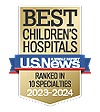
Article updated on May 6, 2021 to reflect the latest COVID-19 vaccine developments
Last fall, the country’s pediatricians called for new COVID-19 vaccines to be appropriately vetted for safety and efficacy for everyone, including children, in a letter sent to Alex Azar, then secretary of the U.S. Department of Health and Human Services and Stephen Hahn, MD, then commissioner of the U.S. Food and Drug Administration.
The American Academy of Pediatrics sent the letter — which was co-written by Stanford Children’s Health chief of pediatric infectious diseases Yvonne Maldonado, MD, and signed by then AAP President Sara Goza, MD — to the federal officials in late September.
“The administration is clearly in a hurry to get COVID-19 vaccines out, and we understand that,” Maldonado told me when we spoke last fall. But leaders at the academy, which represents 67,000 pediatricians across the country, became worried that the federal government might take shortcuts in testing and approving COVID-19 vaccines.
“We wanted to make clear what we, as an academy, would consider proper vetting,” Maldonado said. “We want to be transparent so nobody is caught by surprise [later] if we don’t agree with their definition of safety and efficacy.”
The letter also drew specific attention to the academy’s concerns that children weren’t being included in COVID-19 vaccine trials.
Now, more than seven months later, there is far less uncertainly around COVID-19 vaccination as 56% of the United States adult population has received at least one dose to date. As it relates to children, vaccination is proceeding as pediatric infectious disease experts recommended in their letter to the nation’s health officials, with the vaccine currently available for teens ages 16 and older, soon expected for those 12-15 years, and with clinical trials underway for children ages 6 months to 12 years.
Keeping vaccine recipients safe
Vaccines are generally given to healthy people, and with several COVID-19 vaccines currently available for all Americans 16 years and older. Because vaccines are so widely used, the burden of proof for safety is extremely high, Maldonado said.
Prior to the vaccine rollout, the academy’s recommendations outlined stringent safety metrics for prospective vaccines, including large clinical trials with enough participants and time spent on testing to detect any adverse reactions. Clear efficacy thresholds for the trials were also set in advance, per the AAP’s guidance.
As the letter recommended, data from vaccine trials have been made publicly accessible, and plans for how to analyze the data were pre-set to ensure that findings were not cherry-picked afterward.
In a recent Q&A with CNN, Maldonado reiterated the extensive involvement of public health experts in ensuring vaccine safety for children:
“The U.S. Centers for Disease Control and Prevention (CDC), the U.S. Food and Drug Administration (FDA) and the vaccine companies have been very open and transparent with the American Academy of Pediatrics on all of the vaccine data because they know that we advocate for children and parents and families,” she said.
“Not only are we pediatricians—we are vaccine experts, and we have reviewed the data ourselves on all the trials so far, and we will review the additional data. We would not agree with recommendations – even if they came from the federal government – if we did not feel that they were safe and effective given our vast experience with vaccinating children to keep them healthy in this country.”
Including kids in vaccine testing
As pediatricians, the letter writers felt it was important to stress the importance of children being included in COVID-19 vaccine trials.
Though children appear less likely than adults to have serious symptoms if they get COVID-19, ensuring that vaccines work in children is an important part of the overall strategy to quell the pandemic. “Some people think kids should be allowed to get the natural disease,” Maldonado told me. “I think that’s a mistake.”
More than 300 children in the United States have died of COVID-19 so far and thousands have been hospitalized, she noted, adding that policy makers have a duty to prevent such loss and suffering if possible.
Maldonado said that asymptomatic children can spread SARS-CoV-2 to adults in their household who are at risk for serious illness, so it’s crucial for kids to be vaccinated against it.
“We can’t assume that a vaccine will work the same way in children as adults,” Maldonado said. “If their immune response to the virus is different, their immune response to a vaccine may be different as well.”
Considering all these factors, she said it’s good news that vaccines are being tested in children to show that they are safe and effective for them.
The FDA is expected to grant emergency use authorization for Pfizer’s COVID-19 vaccine for 12-to-15-year-olds by early next week, based on clinical trial data that showed the vaccine elicited 100% efficacy and robust antibody responses in this age group. For younger children, Stanford Medicine is one of five sites around the country participating in a Phase 1 Pfizer clinical trial that involves children in three different age groups: 5 to 12; 2 to 5; and 6 months to 2. Vaccine manufacturer Moderna has also launched a phased trial that will gradually decrease in age, from 11-year-olds to infants.
“We want to make sure that children have access to vaccines not just for themselves but for the community,” Maldonado told the Mercury News.
The Pfizer Phase 1 trial began at Stanford on April 14. Phases 2 and 3 will begin on May 17.
For the latest information about COVID-19, please visit coronavirus.stanfordchildrens.org.
Authors
- Erin Digitale
- more by this author...
- Kate DeTrempe
- more by this author...


 Previous
Previous







